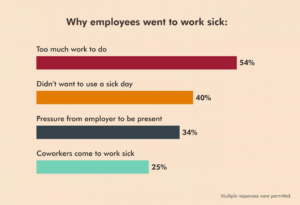Recent research conducted by Accountemps, a Robert Half owned temporary accounting and finance hiring firm has presented a startling revelation regarding employee health. As per the report, 9 out of 10 professionals admitted to going to work at least once with symptoms of cold or flu. While more than half of the respondents cited too much work as a reason not to miss the office, 40% simply turned up because they didn’t want to use a sick day!
HR Technology News: UK Employees Suffer ‘Appraisal Apathy’ as Productivity Sees Sharpest Fall in Five Years
Charlotte and Miami Have the Most Respondents Who Report to the Office While Sick
Accountemps conducted the study in 28 US cities. The sample size was 2,800 workers aged 18 and above, employed in various organizations.
Charlotte, Miami (96% each), Austin, Chicago and Cincinnati (93% each) were identified as the top cities where workers went to work even while feeling ill. Professionals from San Diego and Miami reported that they had to attend work under sick conditions because of pressure from their bosses.
The study brought to light that employees between 25 and 40 years of age comprised a majority (39%) of the professionals reporting to work unwell. The age groups 18 to 24, 55+, and 41 to 54 followed them with 27%, 27%, and 26% respectively.

HR Technology News: Podcast Mini Series By HubSpot Focusses On Taboo Workplace Topics
Bosses Should Take the Responsibility of Setting Examples
While reporting to work unwell may seem like a feasible option at times, it actually hampers overall team productivity and health.
Michael Steinitz, senior executive director at Accountemps said, “Whether it’s due to large workloads, pressure from the boss or because they can’t afford to take time off, it’s all too common for employees to come to the office feeling sick when they really should be resting.” He insisted that in order to recover faster and avoid spreading germs to the co-workers, it was better for professionals suffering from cold and flu to stay at home and rest. Steinitz advised bosses to take a day off whenever they felt ill, and encourage their team members to do the same in such situations.
Michael added that allowing remote work/work from home opportunities could also help in controlling such situations. Furthermore, there is always an option to hire temporary workers to keep assignments on track at times of employee absence.
HR Technology News: Slack Launches Workflow Builder to Improve Workplace Communication Efficiency

